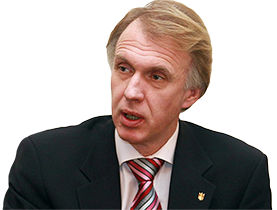Belarus has reached a certain point in its development, which is marked with the dusk of the Lukashenko era. And the question is not even whether the nation's "batska" [father] will once again be able to either seal the overwhelming support of the voters or falsify election results. Something has become too obvious: figuratively speaking, the fruit is overripe. That is, Alexander Lukashenko's continued rule in Belarus for a few more years would be clearly too much politics-wise.
Now there's no doubt that Belarusian society has grown weary of seeing the same face on their TV screens. Incidentally, Russians are just as weary of their longtime leader, too … In fact, Russia and Belarus today are moving along in the same direction of a gradual heat-up of a widespread public discontent.
Many Belarusians still trust Mr Lukashenko
However, I believe the upcoming presidential election in Belarus will play no extraordinary role. If Lukashenko stays in power, it will simply be the last page of his long-running play.
In my opinion, the opposition processes that are currently unfolding in Belarus have not yet acquired a national scale to lead for any major government shifts like the potential removal of Lukashenko from the country's helm. After all, as before, a significant part of Belarusians still trust Lukashenko, and it's they who will form the base of his electoral success this time.
The Belarusian "opposition figures" we are seeing now are, in fact, quite conditional
However, this doesn't mean the Belarusian opposition should cease its efforts – on the contrary, it must draw conclusions from the latest developments, crystallize its shape, and raise adequate leaders. Because Belarusian "opposition figures" we're seeing now are, in fact, quite conditional as they are for the most part pro-Moscow politicians who depend on Russia either financially, or politically, or ideologically. So if such politicians eventually come to power in Belarus, we shouldn't expect any extraordinary shifts or radical changes.
Their coming to power wouldn't change anything in the Belarus-Ukraine relations, either. Indeed, this would be a step forward; however, it would unlikely be serious or noticeable to us. In other words, it doesn't matter to Ukraine today whether Lukashenko stays or goes to be replaced by anyone from among the current opposition leaders.
To claim that any new figure in Belarus would be better than Lukashenko would be quite risky a statement
Lukashenko is ceasing to be a legitimate political figure, even if he wins the election (although we will never know what the actual election results will be). Talking of positive things about Lukashenko, he is a more or less stable player, which is important in politics. Instead, we know almost nothing about the new political figures and we also have no clue, who stands behind them, what their actual political agendas are, what they think about fundamental issues related to Ukraine, how they see further Ukrainian-Belarusian relations, as well as those between Minsk and Moscow, what is their attitude to the European Union and NATO, and what is their stance on security issues. All these questions are yet to be addressed. Therefore, to claim that any new figure in Belarus would be better than Lukashenko would be quite risky a statement.
So I think that Ukrainian-Belarusian relations will be developing the same way as they are now. It's already quite obvious though that the Belarusian opposition has started to wake up from hibernation, ready to act more systematically, in a more organized and logical way and with a more or less adequate and clear program. Perhaps, in one election period, there will be hope for some changes in Belarus. So far, unfortunately, there are only sporadic outbursts of discontent in Belarus that are unable to change the system.
Volodymyr Ohryzko is a Ukrainian diplomat, head of the Center for Russia Studies, former Minister for Foreign Affairs


